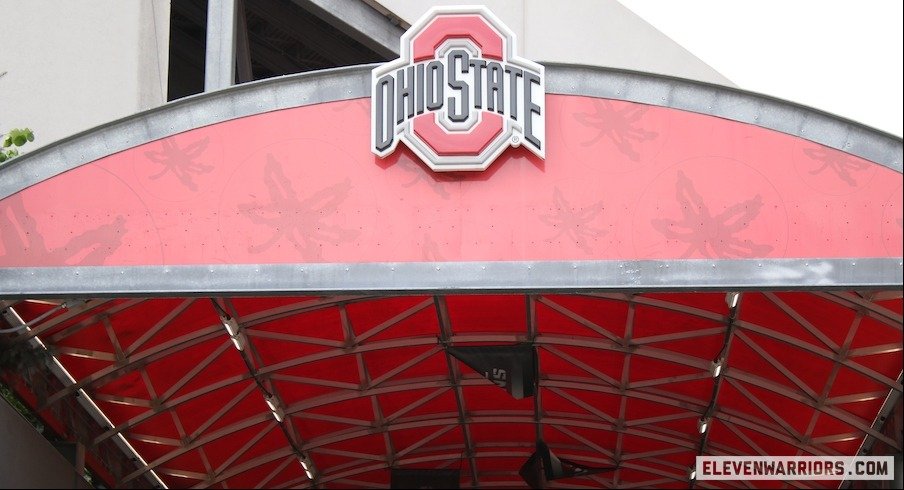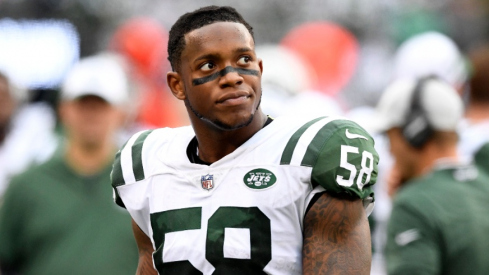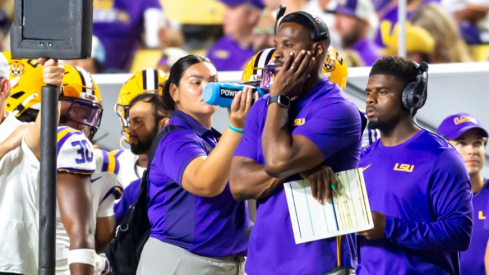While college athletes are now free to sign endorsement deals and profit from their name, image and likeness, there are still plenty of rules they must follow in order to remain eligible to play for their respective schools.
At least for now, the NCAA is leaving it up to each school (and state laws, where applicable) to set name, image and likeness guidelines for its athletes, and Ohio State released its NIL guidelines for Buckeye athletes to the media on Thursday.
Below, we take a look at some of the noteworthy items included within those guidelines, which can be read in full here:
All activities must be disclosed to Ohio State
Per the guidelines, all Ohio State athletes “must submit your proposed verbal or written NIL agreement to Ohio State through Opendorse in advance” for any NIL activity for which they are receiving compensation, allowing Ohio State to review those proposed agreements for any potential conflicts with university agreements.
From the guidelines:
If there is a conflict:
- Ohio State will inform you of the relevant contract provision that is in conflict
- You cannot enter into the proposed contract, but you may negotiate a revision to the proposed contract to avoid the conflict
- You must submit the revised contract to Ohio State for review before you enter into the NIL Activity to ensure compliance with these guidelines and Ohio law
Ohio State athletes will not be allowed to enter NIL agreements that conflict with university sponsorships. Examples of such conflicts listed within the guidelines include agreements that would require athletes to “wear products competitive to Nike during team activities” or “promote beverages competitive to Coca-Cola on-campus.”
“Failure to disclose an NIL Activity in advance could lead to eligibility consequences,” Ohio State’s guidelines state, and athletes “are required to disclose the details surrounding the activity (i.e., what the activity includes, when and where the activity will occur, individuals and businesses connected to the activity, compensation, your verbal or written NIL agreement, etc.).
Athletes who fail to abide by Ohio State’s NIL guidelines could be subject to “loss of privileges and other sanctions as appropriate, including but not limited to verbal or written reprimand, probation, loss of practice privileges, loss of competition privileges, suspension or dismissal from the program.”
No drugs, gambling or adult entertainment
Ohio State athletes will be prohibited from entering into NIL agreements with businesses in any of the following industries:
- Distilled spirits (i.e., hard liquor)
- Tobacco products (including electronic smoking devices, vapor products or products or devices that consists of or contains nicotine that can be ingested into the body)
- Casinos or any entity that sponsors or promotes gambling activities
- Controlled substances
- Marijuana (including legalized or medical) products
- Medical marijuana cultivator, processor, lab or retail dispensary
- Any business engaged in the sale, rental, or exhibition for any form of consideration of adult entertainment that is characterized by an emphasis on the exposure or display of sexual activity
Ohio State’s guidelines also state that the university “reserves the right to restrict other categories of companies, brands or types of contracts that are similar to the above industries (or other areas that are permitted under Ohio law) if Ohio State communicates this information to you before you enroll at Ohio State or 30 days after Ohio’s Executive Order is in effect if you are currently enrolled.”
NIL activities cannot conflict with team activities
While athletes will now be able to make appearances at events and get paid for them, they’ll only be allowed to do that during their free time. Ohio State’s NIL guidelines stipulate that its athletes “may not participate in an NIL Activity while required to be present for practice, scrimmage, or competition” and “may not participate in any NIL Activities during required team activities, on- or off-campus. This includes, among others, during media, team travel, photo sessions, community service, and team building activities.”
The guidelines also tell athletes they “should understand that there may be consequences if you choose to miss class or any other academic obligations to participate in any NIL Activity.”
Athletes must pay to use OSU facilities
Although Ohio State athletes typically have access to facilities for their respective sports at all times, they will not be allowed to conduct NIL activities at those facilities unless they have received “express permission” from Carey Hoyt, Ohio State’s senior associate athletic director of sport administration and student-athlete development, and pay the applicable rental rate for that facility.
Those rental rates aren’t cheap. A half-day rental of the indoor field at the Woody Hayes Athletic Center, for example, costs $2,500, while a full-day rental costs $4,500.
Rental fees will be required to conduct NIL activities in non-athletic facilities on campus, as well.
Athletes will not be allowed to conduct NIL activities in areas that aren’t rentable, such as locker rooms, athletic training areas, team meeting rooms and team lounges.
Trademark usage must be approved
In order to use Ohio State trademarks, service marks, logos, symbols or other intellectual property of the university during NIL activities, athletes will be required to obtain written permission from Ohio State’s office of trademark and licensing services.
Athletes are allowed to use photos or videos containing Ohio State trademarks, logos, service marks, symbols or other intellectual property for their personal brand building on social media, but will be required to receive written approval from the office of trademark and licensing services – regardless of how the photo or video was obtained – to utilize those photos and videos in NIL activities. To use photos that include university trademarks such as uniforms, helmet stripes and Buckeye Leaves, athletes will have to obtain those photos from the university or a university licensee at market pricing and with permission from the copyright owner.
Participants in NIL activities are allowed to promote that they are Ohio State athletes, but “may not imply, directly or indirectly, that Ohio State is endorsing your NIL Activities or any products or services associated with your NIL Activities.”
Team apparel can’t be sold
Although Ohio State athletes will now be able to sell their own custom apparel – Teradja Mitchell and Zed Key are among the Buckeyes already doing that – they will not be allowed to sell any of their team-issued equipment and apparel (listed examples include shoes, jerseys, helmets, sticks/bats and warm-ups) until they conclude their college careers.
Coaches, staff can’t be involved
While Ohio State is providing a variety of educational services to its athletes to help them maximize their NIL opportunities, Ohio State coaches and staff are not allowed to be involved with athletes’ actual NIL activities “in any way.” Ohio State coaches and staff cannot arrange, assist, promote or contribute to athletes’ NIL activities, and athletes cannot compensate Ohio State coaches or staff to assist with NIL activities.
Athletes can hire agents for NIL representation only
Athletes are allowed to hire agents to help them arrange NIL activities. Those agents must be registered under Ohio law unless the agent is an athlete’s immediate family member, and the agent must be compensated at their regular rate; failure to do so could jeopardize an athlete’s NCAA eligibility.
College athletes will still not be allowed to hire agents for the purpose of pursuing careers in professional sports until their collegiate careers are over.
International athletes should exercise caution
Ohio State’s NIL guidelines also include a two-page document that warns its international athletes that it may not be permissible for them to receive NIL compensation “without having serious consequences.”
Because federal laws state that students attending American universities on F-1 visas can come to the U.S. “solely for the purpose” of pursuing their course of study, there are strict limitations on the income-generating opportunities they can participate in. For foreign-born athletes that aren’t U.S. citizens, that means participating in NIL activities within the United States could impact their ability to remain in America.
Ohio State instructs its international athletes not to receive compensation for endorsement deals, event appearances, coaching at camps or signing autographs or establish their own businesses while they are in the United States, though the document notes that athletes may be to partake in those activities when they are outside the United States as long as they are in compliance with Ohio State and NCAA rules.


